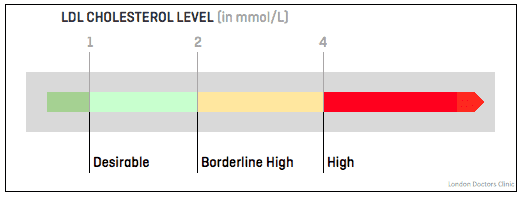CHOLESTEROL: FRIEND OR FOE?
We’re often bombarded with the word 'cholesterol' in both medical and marketing contexts: doctors warn of the perils of high cholesterol, while food companies proudly declare their products as 'cholesterol lowering', or 'high in good cholesterol'. Many people are weary of the word 'cholesterol', and rightly so: high cholesterol levels are associated with cardiovascular disease, that kills 160,000 people annually in the UK alone.
But what exactly is cholesterol, and do we really need to be concerned by it?
Cholesterol is a type of fat made naturally in the body, especially by the liver. It’s transported in the blood in the form of either high or low density lipoproteins – known as good and bad cholesterol respectively. Low-density lipoproteins (LDL cholesterol) especially is associated with increased cardiovascular risk, meaning a higher likelihood of cardiovascular disease. This cardiovascular disease means reduced blood flow to parts of the body due to blood clots or atherosclerosis (the build-up of fatty deposits, narrowing arteries). This can lead to major cardiovascular events, such as heart attacks and strokes.
All this science jargon can get confusing (note the pained expression on any medical students' face when asked about the details of cholesterol), but it doesn’t take a medical degree to realise that heart attacks and strokes are really not good.
Generally:
High cholesterol -> cardiovascular disease -> strokes & heart attacks
So how do you know your cholesterol status?
Investigating cholesterol levels is easy: one simple blood test can provide the essential cholesterol scores to give a great indication of cholesterol status and cardiovascular risk.
Cholesterol score consists of a variety of aspects: total levels, LDL level and HDL level.
Basic cholesterol screens will measure just the total cholesterol level, which gives a general overview of your cholesterol situation. A total cholesterol level below 5 mmol/L is optimum, although it’s thought that the over 60% of the UK population have scores higher than this, suffering from high cholesterol, and putting themselves at risk of cardiovascular diseases.
 The recommended ranges of total cholesterol
The recommended ranges of total cholesterol
More thorough screens will then investigate the levels of both good and bad cholesterol levels separately:
- The bad cholesterol (LDL) level should be 3 or less in a health adult. Since this is the harmful artery-clogging cholesterol, the lower the better!
- High-risk patients (those who smoke, are obese, have high blood pressure, or are diabetic) are advised to aim for a LDL level of 2 or less.
 The recommended ranges of LDL cholesterol
The recommended ranges of LDL cholesterol
- Levels for the good cholesterol (HDL) should be at least 1.2 - the higher the better!
The recommended ranges of HDL cholesterol

Doctors also talk about cholesterol ratio (total cholesterol/ HDL), as a measure of cardiovascular risk, which should be under 4.5 in a healthy adult. Therefore, having a high level of good cholesterol (HDL) will decrease this ratio, meaning a lower risk of cardiovascular disease.
How can we lower our cholesterol level?
The best way to reduce cholesterol levels is by maintaining a healthy, balanced diet. At London Doctors Clinic, our GP's are excellent at advising realistic and reliable ways for patients to reduce their cholesterol levels.
Foods high in saturated fats and trans fats significantly increase your blood cholesterol levels. Look for foods advertised as 'low cholesterol', or 'high in good cholesterol'.
Eating plant sterols, found in foods such as vegetables, fruits, nuts and seeds help to block the absorption of cholesterol in the gut, reducing the amount of cholesterol that can enter the bloodstream. It’s thought that consuming between 1.2-2.4 grams of plant sterols daily, as part of a balanced diet, can help to significantly reduce bad cholesterol (LDL) levels.
So if you’re at all concerned about your cholesterol levels, book in for an appointment with any of our central London clinics and one of our GP's will be more than happy to help!
